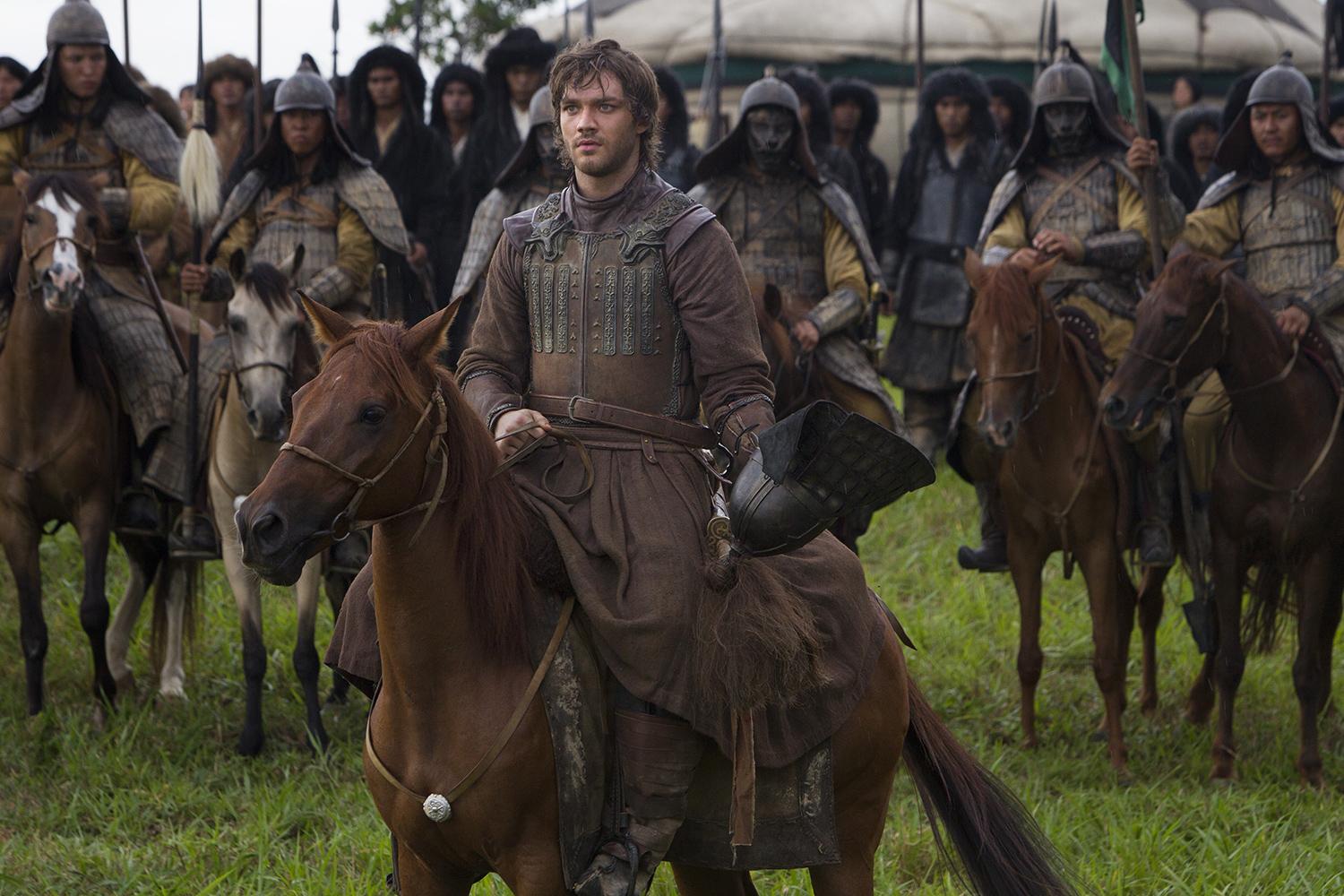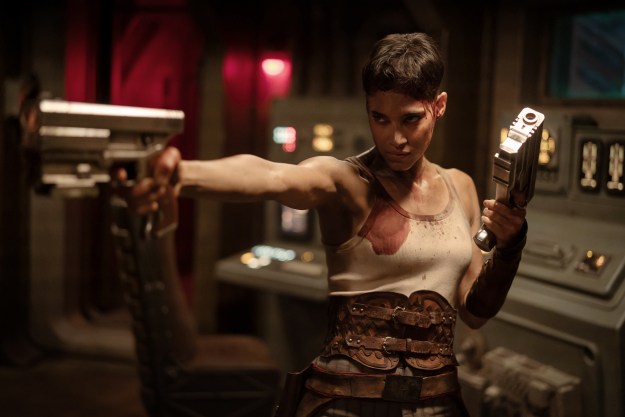Marco Polo is unapologetically big. Netflix has invested quite a bit in developing original content on its Internet TV service, but nothing so far leaves it all on the screen quite like this 10-episode, $90 million production from creator John Fusco. Gorgeously shot and intricately plotted, Marco bellies up to the bar alongside the best of what HBO and other premium cable networks deliver.
It also happens to be a passion project, the product of one man’s long-held interest in a portion of history that is widely misunderstood. Fusco developed a fascination with Eastern cultures at an early age, and it led him all the way to Mongolia in 2007. That’s where Marco Polo was conceived.
“You’re running and gunning. You’re dancing on your feet.”
“In 2007, I crossed part of central Mongolia on horseback with my 13-year-old son and several nomad guides. I always had an interest in Marco Polo from the time I was a kid, and … my son had a particular interest in the Mongol Empire,” Fusco said in a chat with Digital Trends. “So it was a dream father-son trip that we talked about doing for years.”
During the trek, the elder Fusco again and again encountered signs of Polo’s lasting impact on the region. The 13th century Venetian explorer was a fixture in the court of Kublai Khan, serving the Great Khan and future Emperor of China in a variety of roles. It’s the writings that sprung from this period, and not the travelogues Polo is so known for, that define the heart of the new series.
“That’s what fascinates me. We all think of the travelogue part [of his life] … but then he spent 17 years in the court of Kublai Khan,” Fusco said. “He was basically a special agent, journalist, and diplomat. One of the reasons why he used Marco is he was a European and he had no dog in the fight. He could go [to these places] objectively.”
“I heard some historian say it recently: Marco was in many ways the first journalist because he came back with these objective accounts of what he saw.”
Fusco’s enthuasiasm immediately rubbed off on showrunner Daniel Minahan, a veteran of multiple premium HBO series who’s worked with everyone from David Milch to Alan Ball to David Benioff.
“John’s voice in this and John’s passion for Marco Polo [is] what drew me to the project. This guy knows it inside and out, and that’s a great resource,” Minahan said. “He can answer any question about Marco Polo, China, or the martial arts. He can really back it up. He’s really a historian in his own right, besides being a beautiful writer, [and] as a director, I’m attracted to really cool writers.”
Minahan comes to Marco Polo having worked with plenty of showrunners. But here, the production is his to oversee, a uniquely different role than what he’s done before. And this being Netflix, he’s also got to think in terms of building a story that is mindful of creating content for binge-oriented viewers.
“We think of it as a really long-form 10-hour movie.”
“I guess what’s different is the type of story you tell,” Minahan said of the Netflix model. “You don’t have to bring the audience back next week. You want people to continue on and watch the show, but you don’t have to adhere to formulas of a network show, where you build into a commercial, or even a weekly show, where there’s a certain amount of exposition you need to do.”
“With this, we think of it as a really long-form 10-hour movie. So we try not to double back and re-explain things.”
This affects the creative process in numerous, and sometimes completely unexpected ways. There’s the obvious stuff, of course, like “previously on” recaps and “next week on” hype packages. But there’s also a subtler need to be mindful of the audience and how they consume entertainment.
“You have to be attentive that you’re not repeating themes too heavily, because then they become redundant and draw attention to themselves,” Minahan said.

“It was fun for the composers because I would say, ‘We need to just kind of turn that theme a bit.’ And they’d do it in a different instrumentation or do it all in minor key. Just as a way to keep it fresh so that people who are watching episodes back to back to back– they won’t necessarily note it, but it’s the kind of thing that you feel.”
Fusco and Minahan agree that the Netflix Originals approach and binge viewing-friendly production model is more akin to literature than it is to traditional filmed entertainment. “You can read as little or as much as you want. You can read one chapter, or you can read five chapters,” Minahan said, adding, “I found this particularly liberating.”
Ultimately, Marco Polo’s arrival is the product of fortuitous timing. All of the talk from Fusco and Minahan about TV programming embracing a literary format isn’t new. The “It’s not TV, it’s HBO” ethos that emerged in the late ‘90s shaped much of the following decade’s premium cable entertainment. Now that same thinking is evolving as it’s applied to the new-media platform that Internet TV provides.
“Working in this format is exhilarating.”
The greenlighting of Marco Polo feels like a direct result of that evolution. Producer friends told Fusco early on that he should abandon Marco in favor of an easier sell that better connects with today’s audiences. The pitch eventually found a kindred spirit in The Weinstein Company founder Harvey Weinstein, whose appreciation for Asian cinema and East-meets-West stories is well known in Hollywood.
But even then, Fusco and Weinstein struggled to find a home for Marco; it landed at Starz in early 2012 and quickly fizzled there before coming to Netflix. Hungry for more content to complement promising up-and-comers like House of Cards and revived cult favorites like Arrested Development, the Internet TV giant quickly jumped on this big-budget historical epic.
Fusco had long since decided that Marco’s story would work best as a long-form treatment, and Netflix gave him the ability to execute on that idea. Even with minimal experience with developing content for TV, Fusco quickly took to the gig.
“It’s been an amazing experience,” he said. “Netflix has just been so supportive in giving us the freedom to make the show that … Harvey and I envisioned from the beginning.”
“Working in this format is exhilarating,” he continued. “I mean, production-wise? It’s not like making a feature film. You’re running and gunning. You’re dancing on your feet. There’s no time to luxuriate. That kind of exhilaration can actually be addictive.”
Just like binge-viewing. Tune in for Marco Polo’s 10 episodes when it launches on Netflix on December 12, 2014.
Editors' Recommendations
- 9 Netflix shows you didn’t know existed
- Can John Luther kick James Bond’s ass? The Fallen Sun’s creators weigh in on the debate








